Library
All resources
1741 – 1760 of 2423 results

The CALP Network At A Glance
Guidelines and Tools
The CALP Network is a global partnership of humanitarian actors engaged in policy, practice and research within cash transfer programming (CTP). Formed of a community of practice including over 150 organisations and more than 5,000 individuals in the humanitarian sector, the CALP Network is based on...

Research on Food Assistance for Nutritional Impact (REFANI): Literature review
Report
The REFANI literature review identifies existing evidence on the use of Cash Transfer Programmes (CTPs) and the impact of CTPs on acute malnutrition in humanitarian contexts. The review is structured as follows: Section A discusses the global burden of acute malnutrition; Section B highlights...

Integrating Gender throughout a Project’s Life cycle 2.0: A Guidance Document for International Development Organisations and Practitioners
Guidelines and Tools
The overarching premise of this document is that to conduct effective, responsible development work, incorporating gender at all stages of a project’s life cycle – from project design and proposal development to field implementation and monitoring, evaluation and learning – is critical. As such,...
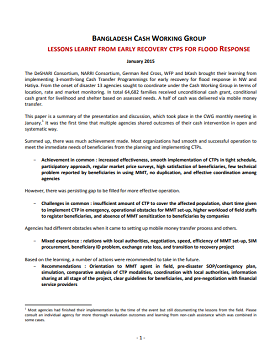
Bangladesh Cash Working Group: Lessons Learnt From Early Recovery CTPS For Flood Response
Report
The DeSHARI Consortium, NARRI Consortium, German Red Cross, WFP and bKash brought their learning from implementing 3-month-long Cash Transfer Programmings for early recovery for flood response in NW and
Hatiya. From the onset of disaster 13 agencies sought to coordinate under the Cash Working Group in...
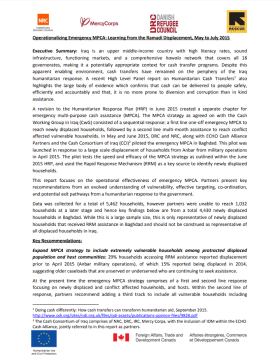
Operationalizing Emergency MPCA: Learning from the Ramadi displacement, May to July 2015
Report
Iraq is an upper middle-income country with high literacy rates, sound infrastructure, functioning markets, and a comprehensive hawala network that covers all 18 governorates, making it a potentially appropriate context for cash transfer programs. Despite this apparent enabling environment, cash transfers...

EMMA Toolkit
Report
Download the publication file here EMMA is a set of tools (this toolkit) and guidance notes (the reference manual on CD-ROM). It encourages and assists front-line humanitarian staff in sudden-onset emergencies to better understand, accommodate, and make use of market systems. It does not offer a...

Lessons Learned for Nepal Earthquake Response
Report
The aim of this product is to improve the performance of humanitarian actors in the response of the Nepal earthquake, assist agencies working in the response and encourage positive action by decision makers. The lessons learned, stated in this document, have been a product of the analysis of main findings...

Electronic Cash Grants in Emergencies: Approaches and lessons learned
Report
Cash distributions in an emergency: A concept that seems so obvious today yet has only recently gained recognition within humanitarian response programming for its speed, efficiency and—above all—effectiveness.
This document provides a snapshot for humanitarian response peers on best practices,...

Challenges and the State of Play of Interoperability in Cash Transfer Programming
Guidelines and Tools
This study explores the factors driving the design of interoperability for Cash Transfer Programming. It outlines the rapidly changing environment in which digital services are emerging, the types of digital collaborations that could be enabled, and the key design challenges that confront effective...
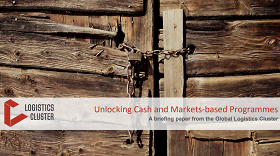
Unlocking Cash and Markets-Based Programmes
Report
In the aftermath of an emergency, humanitarian agencies are increasingly recognising the value of cash and voucher modalities, and market engagement. For Logistics and Supply Chain, our roles are evolving to embrace this trend, adapting our ways of working and even take on new responsibilities. Many...
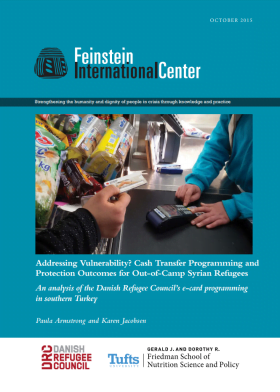
Addressing Vulnerability? Cash Transfer Programming and Protection Outcomes for Out-of-Camp Syrian Refugees
Report
This report explores key issues concerning vulnerability, targeting, and protection in cash transfer programming (CTP) by analyzing a Danish Refuge Council (DRC) project in southern Turkey. It is based on an ongoing “action research” collaboration between DRC and the Feinstein International Center...
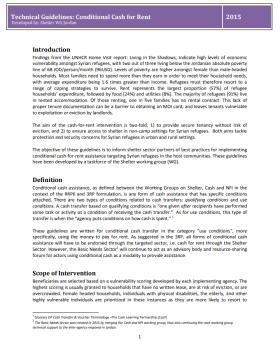
Technical Guidelines: Conditional Cash for Rent
Guidelines and Tools
The guideline was prepared by UNHCR Shelter Working Group in Jordan with the objective of informing shelter sector partners of best practices for implementing conditional cash-for-rent assistance targeting Syrian refugees in the host communities. The guide explores how to define the scope of a cash...

Capacity Building Theory Of Change
Guidelines and Tools
Capacity Building is a foundation of the CALP Network’s vision, focus and mandate, and our Capacity Building Strategy emanates from a Theory of Change that describes how the CALP Network’s inputs and activities result in short-term outcomes and can lead to long-term outcomes and ultimate impact. The...

Introduction to Market Assessments – Video
Presentation
Markets play a central role in the lives and livelihoods of people. Sudden shocks such as natural disasters and conflict can have a strong negative impact on people’s capacity to access basic commodities. Market assessment and analysis should be an integral part of any emergency needs assessment to best...
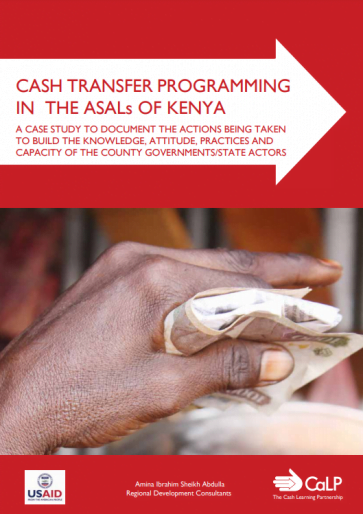
Cash Transfer Programming in the ASALs of Kenya
Case Study
The CALP Network commissioned a study to document the impact and lessons learned from its engagement with state actors in the ASAL counties. The study involved collection of data through secondary and primary sources. Given the focus of the project, a qualitative approach was deemed as most...

Enhancing Food Security and Nutrition during the First 1000 Days through Gender-sensitive Social and Behavioural Change: A Technical Resource Guide
Guidelines and Tools
This technical resource guide is designed to build the capacity of development practitioners working in nutrition and food security to plan, implement, and evaluate gender-sensitive SBC programming in order to improve nutritional outcomes for pregnant and lactating women (PLW) and children under two. It...
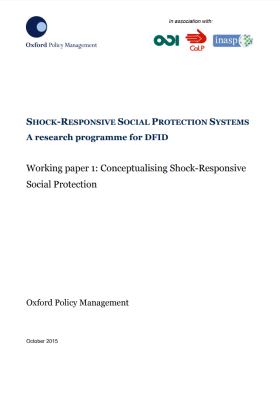
Working Paper 1: Conceptualising shock-responsive social protection
Report
The Shock-Responsive Social Protection Systems study is a two-year, £1 million research programme led by Oxford Policy Management (OPM), in consortium with the Overseas Development Institute (ODI), the the CALP Network and INASP, and funded by the UK Department for International Development (DFID). This...

A case for cash: crisis and disaster-affected populations’ perspective
Report
As the number, scale and duration of humanitarian crises increase, the provision of cash to affected people and communities presents a number of opportunities for more effective and efficient programming. The means by which such opportunities can be maximised is a source of ongoing debate involving a wide...

Privacy Impact Assessment of UNHCR Cash Based Interventions
Report
In 2014, the Office of the United Nations High Commissioner for Refugees (UNHCR) commissioned Trilateral Research & Consulting to conduct Privacy Impact Assessments (PIAs) of two of its Cash-Based Interventions (CBIs) in middle-income countries. The purpose of the PIAs was to help UNHCR assess the...
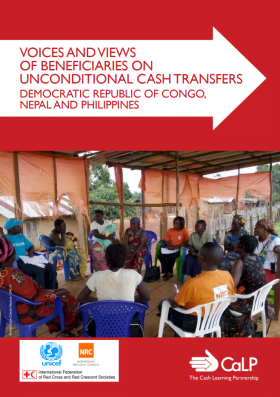
Voices and Views of Beneficiaries on Unconditional Cash Transfers – Democratic Republic of Congo, Nepal and the Philippines
Report
Providing cash in humanitarian emergencies is expanding and the topic is well under discussion within the humanitarian sector with topics ranging from high-level consideration of cash as a tool to transform humanitarian aid, the significance of cash as a way to support beneficiary choice and dignity...